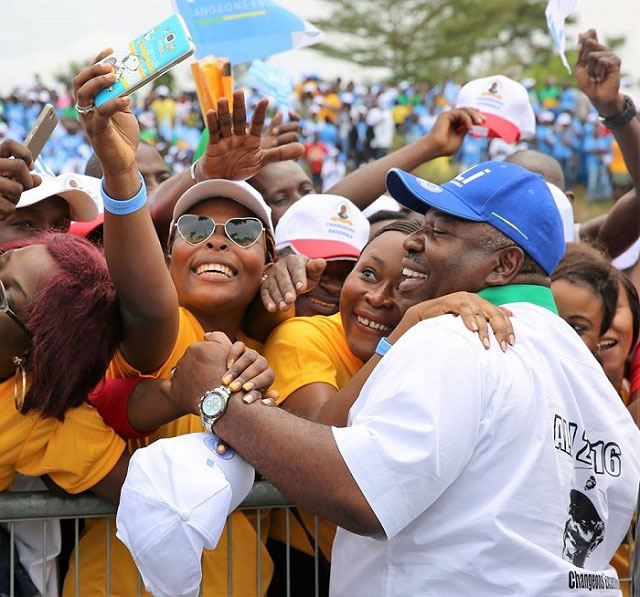
Censorship and the co-option or silencing of opposition have become increasingly common. Dissenting hip hop artists now have to find alternative ways to spread their messages.
Most subversive rap is now produced abroad, with several well-known Gabonese rappers making their music in China, South Africa, the U.S. or France. These artists-in-exile form a highly political network. Their songs reach the streets of Libreville through social media, becoming calls for political debate and action.
Back home, many artists continue the fight in spite of censorship. In 2015, outspoken rapper Keurtyce E became the first to release a song openly opposing the current regime.
Beyond the lyrical content of these songs, Gabonese artists ingeniously use the musical arrangements to subversive ends.
Clever use of sampling
Sampling, cutting and looping allow artists to anchor their music within the local context, by using samples from traditional instruments or famous local songs, for instance. These techniques also carry political meaning, with artists mixing in lyrics, musical samples or slogans from activist musicians who they see as their ideological forebears.
Pierre-Claver Akendengué, for example, an icon of 1960s pan-Africanism and resistor to the authoritarian regime during the one-party system, remains a major source of inspiration for Gabonese musicians today.
Rapper/producer Lord Ekomy Ndong recently demonstrated another means of subversion. In a new song in which he samples excerpts from a speech by President Ali Bongo, juxtaposed with the words of social media activists, to condemn corruption and misappropriation of public funds.
Flareups on social media
During the 2016 election, a great rift appeared in the rap scene between supporters and opponents of the president. A series of flareups on social media and diss-and-response songs deepened the divide.
Bongo had his praise singers: On the one side, rappers aligned with the Bongo family, involved in rallies and producing songs to support the incumbent party.
But Bongo’s opponents were as vocal: Rappers who had previously cooperated with Bongo joined opposition movements to demonstrate their disappointment with government failures. It intensified after troops opened fire on demonstrators following the release of the election results. Several people were killed and numerous others disappeared.
Just two months after this crackdown, Kôba, former poster boy for the system, released the song “Odjuku”. The title is a reference to Bongo’s supposed Nigerian biological father. The rapper reignited the controversy surrounding the president’s origins and joined other artists in declaring “On ne te suit pas” (We don’t follow you).
One year on in 2017, the government was still trying to make people forget its quagmire with events such as the massive August 17 free concert.
Yet, the protest movement is still active: demonstrations continue within striking government departments and at Libreville University. In the streets of Paris and New York, Gabonese expats rally together.
Through their songs, rappers like Lestat XXL and Lord Ekomy Ndong, commemorate the sorrowful anniversary of the 2016 repression:” Here no one will forget. We’ll hoist up the flame… No red on my flag. Nothing will ever be the same”.
****
Alice Aterianus-Owanga is the author of “Rap Was Born Here! Music, Power and Identity in Modern Gabon”, published by Maison des Sciences de l’Homme, September 2017. Translated from the French by Alice Heathwood for Fast for Word. She is a Postdoctoral researcher in Anthropology, Université de Lausanne.
 The Independent Uganda: You get the Truth we Pay the Price
The Independent Uganda: You get the Truth we Pay the Price



